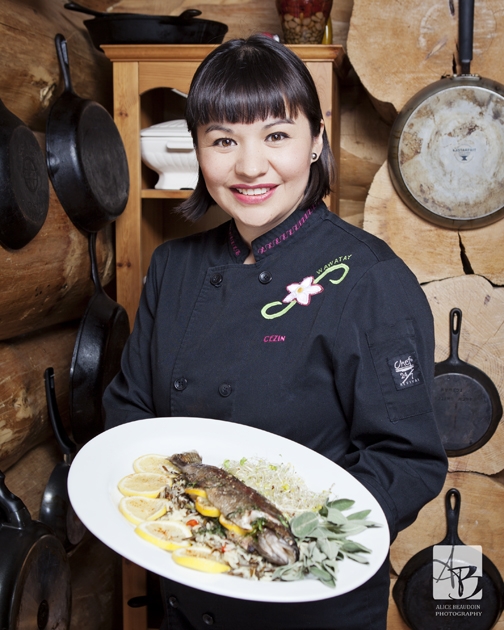Marie-Cecile Nottaway, photo credit to Wawatay Catering.
As graduates made their way to the stage at Algonquin College’s recent convocation ceremonies, there were no violins. Instead, the graduates’ processional moved to the powerful beat of the pow-wow drum.
It was a way for the College to acknowledge that the ceremony, and the College itself, are on the ancestral territory of the Algonquin People — and just one of the ways Algonquin College is embracing the culture that is its namesake.
Just this spring, the College submitted an ambitious multi-million dollar proposal to the federal government to develop the Algonquin College Innovation, Entrepreneurship and Learning Centre. The Institute for Indigenous Entrepreneurship, part of the state-of-the-art facility, would help Indigenous students take entrepreneurial ideas and turn them into reality through a combination of mentorship, peer support and cultural connections.
“Our Institute for Indigenous Entrepreneurship is going to be the first of its kind in Ontario,” says Cheryl Jensen, president of Algonquin College. “And it’s going to be developed in partnership with our indigenous community partners. I think that’s an important part of this equation because it will help us ensure that this Centre is just as much about culture as it is about entrepreneurship, and that’s a relationship that will help our students build confidence and thrive here at the College, and also when they return to their own communities.”
Andre O’Bonsawin, the College’s Aboriginal Portfolio Manager, says bringing the Indigenous community into the building process is going to help the College create an environment of trust.
“The Indigenous community wants to feel part of the College and so it’s important to include them in decisions that affect their students,” he explains. “For a long time, just like the residential schools, they were forced to do things, so we want to be inclusive.”
And the Indigenous community will also have a role to play once the Institute opens its doors — providing guidance, guest speakers and networking opportunities.
“It will be a place where Indigenous learners can express themselves culturally and their values will be respected while learning from Indigenous mentors on how to launch a business. The Centre will allow our learners to talk to about the challenges of being an Indigenous entrepreneur and conducting business with non-Indigenous businesses,” says O’Bonsawin.
Algonquin College was home to 1,182 self-identified Indigenous students this past term — a number that’s growing at about 12 per cent each year.
Nathaniel Parant, Senior Program Lead at Ottawa’s Wabano Centre for Aboriginal Health, says the young Indigenous population in general is on the rise.
“One thing that’s very important to note is that 68 per cent of Indigenous people are youth,” says Parant, who works with a number of Indigenous entrepreneurs. “It’s a totally inversed statistic compared to mainstream cultures.”
And, he says, it’s a young demographic that’s seeking opportunities to get involved in entrepreneurial ventures but that is simultaneously hampered by a cultural mindset at odds with the aggressive “go get ‘em” philosophy that’s traditionally associated with growing a business.
Related: Algonquin College is Uniting Passion.
“It’s a different lens of the world,” says Parant. “(In indigenous culture) there’s more of an understanding of the circle — everyone in the circle is equal, different and interconnected. That’s a key part to Indigenous entrepreneurship.”
Phil Commonda, Aboriginal Events Coordinator at the College, says this understanding is exactly what is needed to help these students succeed. A former student of the College in the late ‘90s, Commonda returned to his alma mater to work and now helps Indigenous students every day.
“Since I’ve been back, Algonquin College has been a very supportive place for Indigenous learning,” he says. “It’s allowing Aboriginal students to be elevated, it’s giving them confidence so that they can be innovative.”
And the College is already seeing the results. Culinary alumna Marie-Cécile “Cezin” Nottaway is one of the best-known success stories so far. Her Wawatay Catering company has been winning rave reviews and some high-profile clients — including former Governor General Michaëlle Jean.
“Being an entrepreneur is in our DNA,” says Nottaway. “We were traders before time immemorial.”

